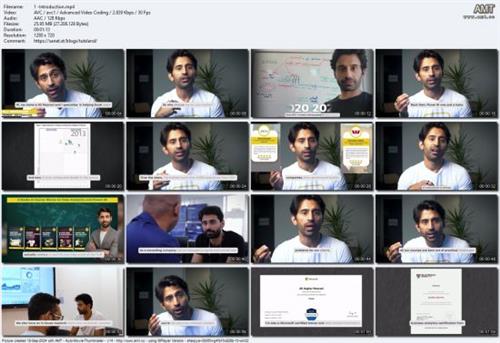- Thread Starter
- #1
Advanced Power BI: Expert Data Analysis and Visualization

Published 9/2024
MP4 | Video: h264, 1280x720 | Audio: AAC, 44.1 KHz, 2 Ch
Language: English | Duration: 7h 38m | Size: 5.46 GB
From Data to Decisions with Advanced Modeling Techniques
What you'll learn
Understand the Power BI Data Cycle: Learn how to gather, transform, consolidate, and enrich data for effective visualization and sharing.
Develop Robust Data Models: Learn how to create and manage fact tables, dimension tables, and role-playing dimensions for comprehensive data modeling.
Master Data Transformation Techniques: Gain expertise in using advanced transformation methods, including fuzzy matching and complex data set adjustments.
Apply Role-Level Security: Learn to implement role-level security settings to control data access effectively.
Conduct Data-driven Storytelling: Develop the ability to use Power BI to tell compelling data stories, highlighting key insights and trends.
Requirements
Learners should have a fundamental understanding of Power BI's interface, including how to create basic reports and dashboards.
Learners should have Power BI Desktop installed on their computer to practice and follow along with course exercises.
Description
This Advanced Power BI course is meticulously designed to equip professionals with the expertise needed to master data analytics and visualization at an advanced level. By delving into critical aspects such as data transformation, modeling, and visualization, this course ensures you gain comprehensive skills to handle complex data scenarios effectively. Participants will learn to connect and consolidate data from diverse sources, automate data processes, and build robust data models. The course also covers advanced topics like role-level security, fuzzy matching, and the creation of transformation tables, enabling you to manage and protect data with confidence.Taking this course will provide you with practical, hands-on experience through real-world applications and case studies. You will learn to create insightful reports and compelling visualizations that drive informed decision-making. By the end of the course, you will be equipped not only with advanced technical skills but also with the ability to apply these techniques to solve business problems and optimize data-driven strategies. This course is ideal for professionals looking to elevate their Power BI capabilities and leverage data analytics to achieve business success.Course Outline:Introduction to Advanced Power BI CourseIntroduction to the trainerOverview of the courseCommon challenges in mastering Power BIImportance of core conceptsData Cycle: Getting DataStarting with a vision and end goalsIdentifying data sourcesConnecting to disparate systemsCentralized data warehousesMethods for importing dataData Cycle: Data TransformationImportance of data transformationCommon data issuesAutomating data transformationData wrangling and mungingData Cycle: Data ConsolidationImportance of data consolidationData flattening vs. data modelingBenefits of data modelingHandling large datasetsData Cycle: Enrichment, Visualization & SharingData enrichment techniquesCreating compelling visualizationsEffective data sharing methodsData Transformation: Finding Problems & Understanding Column ProfileIdentifying data problemsUnderstanding column profilesUsing data profiling toolsData Transformation: Fuzzy MatchConcept of fuzzy matchingImplementing fuzzy matching in Power BIHandling data quality issuesData Transformation: Transformation Table with Fuzzy MatchCreating transformation tablesUsing transformation tables with fuzzy matchingBest practices for accurate data mappingData Transformation: Fuzzy, Transformation Table PracticeHands-on practice with transformation tablesTroubleshooting common problemsPerforming sense checksData Transformation: Transforming City Data SetCase study: transforming city dataApplying learned techniquesReinforcing key concepts through practical applicationData Transformation: Completing Sales FileCleaning and transforming sales dataHandling errors and missing valuesMaking executive decisions on data handlingData Transformation: Product FileImporting and cleaning product dataStandardizing product informationDealing with inconsistent data entriesData Consolidation: Model FormattingUnderstanding automatic relationship detectionDeactivating auto-detect for manual relationship managementFormatting and enriching dataData Enrichment: Calendar Table (Simple)Creating a simple calendar tableUsing DAX for date-related calculationsEnhancing reports with date intelligenceData Enrichment: Calendar Table (Fiscal Year)Creating a fiscal year calendar tableCustomizing date intelligence for fiscal reportingUtilizing DAX for advanced date calculationsQ&A SessionRecap of previous sessionsAddressing participant questions and concernsPractical tips and insights from real-world use casesData Model: Fact TableUnderstanding fact tablesCharacteristics and purpose of fact tablesCreating and managing fact tables in Power BIData Model: Dimension Table & Star SchemaUnderstanding dimension tablesCharacteristics and purpose of dimension tablesImplementing star schema in data modelingData Model: Cardinality and Cross Filter DirectionUnderstanding cardinality in relationshipsManaging cross-filter directionBest practices for relationship managementData Model: Merge and Role-Playing DimensionsMerging tables for optimized data modelsCreating role-playing dimensionsAdvanced data modeling techniquesData Model: Comparing 2 Fact Tables (Theory)Theoretical concepts of comparing fact tablesUnderstanding common grainsImplications of comparing different grainsData Model: Comparing 2 Fact Tables (Practice)Practical application of comparing fact tablesHandling many-to-many relationshipsBest practices for accurate comparisonsComparing Sales and Inventory (Considerations & Reporting)Comparing sales and inventory dataManaging data discrepanciesEffective reporting techniquesRecap and Data Enrichment Using Custom Columns CCRecap of key conceptsData enrichment techniques using custom columns (CC)Practical examples and hands-on exercisesComparing Order Date and Ship DateComparing different date fieldsHandling date discrepanciesCreating meaningful insights from date comparisonsComparing Target Sales vs Actual Sales Part 1Introduction to target vs actual sales comparisonSetting up the data modelCreating relationships and calculationsComparing Target Sales vs Actual Sales Part 2Advanced techniques for comparing target vs actual salesHandling complex data modelsBest practices for accurate reportingRole Level SecurityImplementing role-level security in Power BIManaging user access and permissionsBest practices for secure data modelsNormalizing a Flat FileIntroduction to normalizing flat filesStep-by-step process for creating dimension tablesBest practices for efficient data modelingClosing and Q&ARecap of the entire courseFinal questions and answers
Who this course is for
Those looking to build a career in data science and analytics and want to add advanced Power BI skills to their toolkit.
Those looking to build a career in data science and analytics and want to add advanced Power BI skills to their toolkit.
Current Power BI users who have mastered the basics and are ready to explore advanced features like complex data modeling, DAX, and data transformation.
IT specialists and database managers who want to integrate Power BI into their reporting workflows and need to understand advanced data modeling techniques.
Independent consultants and freelancers in the field of data analytics who wish to offer more advanced Power BI services to their clients.
Homepage:

Download link
rapidgator.net:
ddownload.com:

Published 9/2024
MP4 | Video: h264, 1280x720 | Audio: AAC, 44.1 KHz, 2 Ch
Language: English | Duration: 7h 38m | Size: 5.46 GB
What you'll learn
Understand the Power BI Data Cycle: Learn how to gather, transform, consolidate, and enrich data for effective visualization and sharing.
Develop Robust Data Models: Learn how to create and manage fact tables, dimension tables, and role-playing dimensions for comprehensive data modeling.
Master Data Transformation Techniques: Gain expertise in using advanced transformation methods, including fuzzy matching and complex data set adjustments.
Apply Role-Level Security: Learn to implement role-level security settings to control data access effectively.
Conduct Data-driven Storytelling: Develop the ability to use Power BI to tell compelling data stories, highlighting key insights and trends.
Requirements
Learners should have a fundamental understanding of Power BI's interface, including how to create basic reports and dashboards.
Learners should have Power BI Desktop installed on their computer to practice and follow along with course exercises.
Description
This Advanced Power BI course is meticulously designed to equip professionals with the expertise needed to master data analytics and visualization at an advanced level. By delving into critical aspects such as data transformation, modeling, and visualization, this course ensures you gain comprehensive skills to handle complex data scenarios effectively. Participants will learn to connect and consolidate data from diverse sources, automate data processes, and build robust data models. The course also covers advanced topics like role-level security, fuzzy matching, and the creation of transformation tables, enabling you to manage and protect data with confidence.Taking this course will provide you with practical, hands-on experience through real-world applications and case studies. You will learn to create insightful reports and compelling visualizations that drive informed decision-making. By the end of the course, you will be equipped not only with advanced technical skills but also with the ability to apply these techniques to solve business problems and optimize data-driven strategies. This course is ideal for professionals looking to elevate their Power BI capabilities and leverage data analytics to achieve business success.Course Outline:Introduction to Advanced Power BI CourseIntroduction to the trainerOverview of the courseCommon challenges in mastering Power BIImportance of core conceptsData Cycle: Getting DataStarting with a vision and end goalsIdentifying data sourcesConnecting to disparate systemsCentralized data warehousesMethods for importing dataData Cycle: Data TransformationImportance of data transformationCommon data issuesAutomating data transformationData wrangling and mungingData Cycle: Data ConsolidationImportance of data consolidationData flattening vs. data modelingBenefits of data modelingHandling large datasetsData Cycle: Enrichment, Visualization & SharingData enrichment techniquesCreating compelling visualizationsEffective data sharing methodsData Transformation: Finding Problems & Understanding Column ProfileIdentifying data problemsUnderstanding column profilesUsing data profiling toolsData Transformation: Fuzzy MatchConcept of fuzzy matchingImplementing fuzzy matching in Power BIHandling data quality issuesData Transformation: Transformation Table with Fuzzy MatchCreating transformation tablesUsing transformation tables with fuzzy matchingBest practices for accurate data mappingData Transformation: Fuzzy, Transformation Table PracticeHands-on practice with transformation tablesTroubleshooting common problemsPerforming sense checksData Transformation: Transforming City Data SetCase study: transforming city dataApplying learned techniquesReinforcing key concepts through practical applicationData Transformation: Completing Sales FileCleaning and transforming sales dataHandling errors and missing valuesMaking executive decisions on data handlingData Transformation: Product FileImporting and cleaning product dataStandardizing product informationDealing with inconsistent data entriesData Consolidation: Model FormattingUnderstanding automatic relationship detectionDeactivating auto-detect for manual relationship managementFormatting and enriching dataData Enrichment: Calendar Table (Simple)Creating a simple calendar tableUsing DAX for date-related calculationsEnhancing reports with date intelligenceData Enrichment: Calendar Table (Fiscal Year)Creating a fiscal year calendar tableCustomizing date intelligence for fiscal reportingUtilizing DAX for advanced date calculationsQ&A SessionRecap of previous sessionsAddressing participant questions and concernsPractical tips and insights from real-world use casesData Model: Fact TableUnderstanding fact tablesCharacteristics and purpose of fact tablesCreating and managing fact tables in Power BIData Model: Dimension Table & Star SchemaUnderstanding dimension tablesCharacteristics and purpose of dimension tablesImplementing star schema in data modelingData Model: Cardinality and Cross Filter DirectionUnderstanding cardinality in relationshipsManaging cross-filter directionBest practices for relationship managementData Model: Merge and Role-Playing DimensionsMerging tables for optimized data modelsCreating role-playing dimensionsAdvanced data modeling techniquesData Model: Comparing 2 Fact Tables (Theory)Theoretical concepts of comparing fact tablesUnderstanding common grainsImplications of comparing different grainsData Model: Comparing 2 Fact Tables (Practice)Practical application of comparing fact tablesHandling many-to-many relationshipsBest practices for accurate comparisonsComparing Sales and Inventory (Considerations & Reporting)Comparing sales and inventory dataManaging data discrepanciesEffective reporting techniquesRecap and Data Enrichment Using Custom Columns CCRecap of key conceptsData enrichment techniques using custom columns (CC)Practical examples and hands-on exercisesComparing Order Date and Ship DateComparing different date fieldsHandling date discrepanciesCreating meaningful insights from date comparisonsComparing Target Sales vs Actual Sales Part 1Introduction to target vs actual sales comparisonSetting up the data modelCreating relationships and calculationsComparing Target Sales vs Actual Sales Part 2Advanced techniques for comparing target vs actual salesHandling complex data modelsBest practices for accurate reportingRole Level SecurityImplementing role-level security in Power BIManaging user access and permissionsBest practices for secure data modelsNormalizing a Flat FileIntroduction to normalizing flat filesStep-by-step process for creating dimension tablesBest practices for efficient data modelingClosing and Q&ARecap of the entire courseFinal questions and answers
Who this course is for
Those looking to build a career in data science and analytics and want to add advanced Power BI skills to their toolkit.
Those looking to build a career in data science and analytics and want to add advanced Power BI skills to their toolkit.
Current Power BI users who have mastered the basics and are ready to explore advanced features like complex data modeling, DAX, and data transformation.
IT specialists and database managers who want to integrate Power BI into their reporting workflows and need to understand advanced data modeling techniques.
Independent consultants and freelancers in the field of data analytics who wish to offer more advanced Power BI services to their clients.
Homepage:
Screenshots

Download link
rapidgator.net:
You must reply in thread to view hidden text.
ddownload.com:
You must reply in thread to view hidden text.
